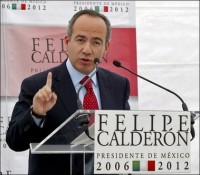 Phoenix At one o’clock Friday afternoon news stations in Phoenix seemed to be responding to a three alarm fire. Arpaio was ranting about his latest raid at a press conference. More groups were announcing a boycott of the Arizona Diamondbacks baseball team, and word was everywhere that the Mexican government had closed the border to Arizona in protest of the new law. I was sitting in a planning meeting around foreclosure resistance and there was animated conversation about where people would drive to cross the border if they found themselves visiting relatives and blocked from coming back home. No one was questioning that the story was undoubtedly true and appropriate, and everyone but me had family and friends south of the border.
Phoenix At one o’clock Friday afternoon news stations in Phoenix seemed to be responding to a three alarm fire. Arpaio was ranting about his latest raid at a press conference. More groups were announcing a boycott of the Arizona Diamondbacks baseball team, and word was everywhere that the Mexican government had closed the border to Arizona in protest of the new law. I was sitting in a planning meeting around foreclosure resistance and there was animated conversation about where people would drive to cross the border if they found themselves visiting relatives and blocked from coming back home. No one was questioning that the story was undoubtedly true and appropriate, and everyone but me had family and friends south of the border.
As it turned out, I cannot find any evidence that there was a border closing into Arizona on Friday, but count on the fact that it is coming and is inevitable as long as the viciously anti-Mexican, anti-immigrant, and racist apartheid law is on the books in Arizona.
The President of Mexico, Felipe Calderon, said as much almost two weeks ago. He was quoted in the UK Guardian in strong terms on April 27th.
The law, which gives the police the right to stop anyone they suspect is an illegal immigrant, “opens the door to intolerance, hate, discrimination and abuse in law enforcement”, Calderón said last night. Trade and political ties with Arizona would be “seriously affected”, he warned.
“Nobody can sit around with their arms crossed in the face of decisions that so clearly affect our countrymen,” Calderón said in a speech at the Institute for Mexicans Abroad.
Talking to activists organizing the Arizona-based movement in Phoenix to oppose the implementation of SB1070 and force its repeal, it was common knowledge that the Mexican Ambassador to the United States had not only visited Arizona to warn of the consequences, but had also made himself available to meet with the organizers and was very frank in his private assessments that it was almost inevitable that Mexico would move to not only join but lead a boycott of Arizona from the south, because the domestic politics within the country “would force us to act.” In so many words he was saying that President Calderon would be beating the drums over the 90-day period before the bill goes into effect, but the united opposition and outrage in Mexico to this bigoted act of racial profiling and Mexican-bashing would inevitably lead to Mexico boycotting Arizona.
Would that really mean closing the border from Mexico to the USA?
What the haters refuse to grip is the constant traffic between the two countries not only for business and commerce, but everyday tasks of workers going back and forth for jobs and shopping, and US citizens living in Mexico particularly in twin cities like Douglas, AZ and Nogales, Mexico. People living along the border still shudder at the post 9/11 delays that would mean 3 and 4 hour waits to cross from Tijuana into San Diego for example. No country can easily do this on a permanent basis, but tactically, it is easy to imagine slowdowns and day-to-day shutdowns to send the message to the country state of Arizona, that Mexico will not tolerate apartheid for its countrymen or those with roots across the border.
Mexico is an ace in the deck for organizers. No one can control what their next steps are, but the movement will be poised to take advantage of the anger in Mexico and continue to fuel it. Organizers are also supremely confident that whatever Mexico does will help their movement and put pressure not only on the state government, but also directly on President Obama and Secretary of State Hilary Clinton.